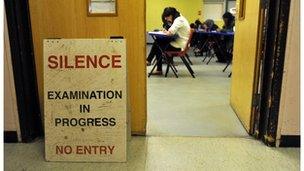Exam boards defend GCSE English role in High Court
- Published

Achieving a C grade in GCSE English is crucial for entry into further education and employment
Examiners raised the mark needed for a GCSE English C grade based on their judgement of the quality of the work, lawyers for the examiners have said.
The boards AQA and Edexcel have been defending their roles in shifting grade boundaries, on the second day of a judicial review at London's High Court.
An alliance of schools, teaching unions and councils wants the court to raise the grades of exams taken in June.
But AQA said this would mean awarding C grades for work below the standard.
Lawyers for the alliance have claimed thousands of students missed out on the grades they needed because of a last-minute "statistical fix" and have argued for the June exams to be regraded in line with those taken in January when the boundaries were lower.
The case centres on more than 10,000 pupils who missed out on a C grade in GCSE English which is a crucial benchmark used for entry into further education, vocational training and employment, but the decision affected all the grade margins.
In total up to 50,000 pupils in England, Wales and Northern Ireland could receive higher grades if the judges uphold the challenge.
On Wednesday lawyers representing Edexcel told the High Court that grade boundaries had to be raised for the June exams compared to those in January to stop an "unacceptable lowering of the standard required for a C in GCSE English, as compared with the standard in previous years".
They argued that otherwise there would have been "grade inflation without any academic justification".
Nigel Giffin QC added that "such a failure to maintain standards from year to year would rightly cause a loss of confidence in the worth of the qualification, and it would be grossly unfair to those who took their GCSEs in previous years".
Earlier Clive Lewis, QC for AQA, said the board had followed official guidelines in deciding to alter the grade boundaries between the January and June papers and was satisfied that the June results were correct.
Primary predictions
AQA says its examiners used statistically recommended boundaries using predictions based on the year group's achievements at the end of primary school.
However they said that the examiners ultimately reached their own conclusions and set a higher boundary than that indicated by the predictions to reflect their judgement of the standard of the work that merited a C grade
The case against the regulator Ofqual and exam boards AQA and Edexcel has been brought by a total of 167 individual pupils, supported by 150 schools and 42 councils, plus six professional bodies, including teaching unions.
Some 2,300 students who took exams set by the Welsh exam board WJEC in Wales have already been regraded on the orders of the Welsh government, which regulates exams set there.
Ofqual is expected to give evidence on Thursday, the final day of the hearing. A judgement is expected next week.
- Published13 February 2013
- Published11 December 2012